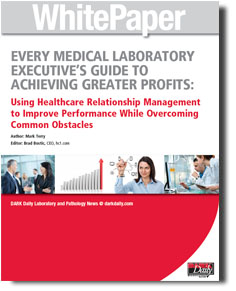Clinical laboratories and pathology groups are deploying customer relationship management tools as a way to deliver more value to physicians and other providers
Healthcare’s accelerating shift away from fee-for-service payment and toward value-based reimbursement presents new challenges to clinical laboratories and pathology groups. These new payment models motivate providers to seek strategic partners who can deliver added value.
To succeed in this paradigm, clinical laboratories must differentiate themselves. This will require effective management of client relationships. Labs will soon need to do much more than simply process medical test orders and send lab results back to referring physicians. In fact, early-adopter lab organizations are accomplishing these goals by using client relationship management (CRM) tools.
To serve these lab organizations, vendors are bringing customized CRM tools to market. Unlike the generic customer relationship management products of past years, these next generation CRM products are tailored to meet the complex needs of healthcare organizations. CRM systems that are customized to the needs of clinical laboratories and pathology groups are now available.
Healthcare Reform Is Now Altering Long-Standing Relationships
One lab industry expert watching this trend unfold is Brad Bostic, Founder and CEO of hc1.com, based in Indianapolis, Indiana.
“In recent years, healthcare reform has begun to alter long-standing relationships throughout the industry,” he said. “Those changes are causing diagnostic healthcare service providers—including clinical laboratories and pathology groups—to shift their focus toward transforming data into actionable healthcare insights. In that way, the lab can become a strategic partner with the healthcare providers it serves.”
Bostic emphasized that clinical labs and pathology groups must move beyond the mindset of simply providing a lab test result in a timely fashion. “Physicians are being pushed to be more proactive and more effective in treating patients,” he noted. “This creates new opportunities for labs to step up and deliver information about quality of care and about gaps in care.”

Healthcare’s evolution toward integrated care and value-based reimbursement will bring new challenges for the nation’s clinical laboratories and anatomic pathology groups. According to Brad Bostic (pictured above), Founder and CEO of hc1.com, medical laboratories will want to incorporate strategic healthcare information management solutions as a way to deliver actionable information to client physicians. (Photo copyright hc1.com)
In July, the federal Centers for Medicare & Medicaid Services (CMS) announced that it would accelerate a plan to increase what it pays physicians for delivering quality care to patients, according to articles published in The Washington Post and Kaiser Health News. The change would affect 500,000 doctors in large group practices.
Door Is Opening For Clinical Labs To Forge Strong Relationships
“This opens the door for clinical labs to forge strong relationships with physicians,” said Bostic. “A lab can do this by delivering insights that help a client physician better manage his or her patient populations while, at the same time, providing the physician with the data that proves he or she is practicing high quality medicine.
“A big part of this trend is the growing number of providers who are forming integrated care organizations—whether accountable care organizations (ACOs) or patient-centered medical homes (PCMHs),” he noted. “These integrated care organizations have a razor focus on doing what’s best for each patient.
“When a clinical lab delivers exceptional service—including rich sets of actionable intelligence—it will naturally forge tighter relationships with physicians, health plans, ACOs, and other providers,” Bostic continued. “We already see examples of medical labs serving multiple health plans and multiple ACOs. These same labs rely on customer relationship management systems to deliver lab test results plus useful information on both the quality of care and specific gaps in patients’ care.”
Healthcare CRMs Can Integrate Data from Disparate Sources
The need to integrate data from disparate sources is one primary driver in the trend among all providers—including clinical laboratories and pathology groups—to acquire and use client relationship management systems. And it is not just client relationship management systems that can be useful. Various middleware solutions that feed real-time management dashboards on operations and workflow for labs are experiencing equally robust growth among laboratory organizations nationwide.
Bostic’s firm, hc1.com, is a player in this market. “To describe this business approach, we’ve coined the term ‘strategic healthcare information management’,” he said. “That plays into the name of our solution, which is the ‘hc1 Healthcare Relationship Management Cloud.’

Pictured here is the White Paper on strategic healthcare relationship management, written especially to help clinical laboratory managers and pathologists understand the fast-growing trend of using customer relationship management solutions to deliver added value to physicians. It can be downloaded free by visiting darkdaily.com.
“It’s one strategy and solution that labs can use securely online, without purchasing any hardware or software,” noted Bostic. “The lab is now able to produce and deliver added value in the form of business and clinical intelligence to support physicians, hospitals, and other providers. We believe that effective use of strategic healthcare information management approaches will define winners and losers in the clinical laboratory business in the coming years.”
Clinical Laboratories Are Data Rich
These trends have developed because clinical laboratories are data rich. “Labs already possess the data required to create comprehensive patient profiles, including diagnosis codes, tests ordered, demographics, and much more,” explained Bostic. “Now we see progressive lab organizations taking that next step. They are embracing solutions that capture a comprehensive view of all patients and physicians and allow them to share that information in real time to support referring physicians in ways that add value.”
White Paper on CRM for Clinical Labs and Pathology Groups
Recognizing the importance of these issues for clinical laboratories, Dark Daily has published a new white paper on this trend, “Every Medical Laboratory Executive’s Guide To Achieving Greater Profits: Using Healthcare Relationship Management to Improve Performance While Overcoming Common Obstacles .” The report is available as a free download by clicking here.
Related Information:
Medicare Announces Plans To Accelerate Linking Doctor Pay To Quality
The Affordable Care Act At Three: Paying For Quality Saves Health Care Dollars
Business Intelligence Comes to The Clinical Laboratory Industry – Finally!



